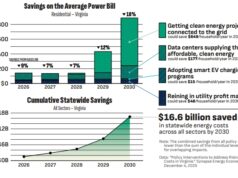By Josh Stanfield of Activate Virginia
Though there’s been concern about Dominion’s campaign contributions to Virginia politicians, rarely do we discuss a more blatant conflict. Believe it or not, some of our legislators own Dominion stock yet still vote on bills aimed at generating obscene profits for the company.
You can find this information on the required Statement of Economic Interest filed by the legislators. The numbers below are based on 2017 filings. As Patrick Wilson reported a couple days ago in RTD, the public will not have access to the 2018 filings until March 15 – days after the legislative session ends.
Dominion Stockholders
Governor Ralph Northam (D): $5,000 – $50,000 (UPDATE by Lowell — Gov. Northam’s communications director, Brian Coy, emailed to say that “the Governor sold his holdings in the company before he took office” and “has since placed his holdings into a blind trust.”)
Delegate Chris Jones (R): $50,000 – $250,000
Delegate Jay Leftwich (R): $5,000 – $50,000
Delegate Barry Knight (R): $50,000 – $250,000
Delegate Keith Hodges (R): $5,000 – $50,000
Senator Siobhan Dunnavant (R): $50,000 – $250,000
Senator Tommy Norment (R): $50,000 – $250,000
Senator Bill DeSteph (R): In Excess of $250,000
The Governor
As you can see, Governor Northam owns Dominion stock – unless he’s sold it since his campaign. Beth Reinhard at WaPo wrote a piece last year on Northam’s Dominion conflicts. The Northam campaign’s line:
“Northam says that if elected governor, he would put his stock investments in a blind trust managed by a trustee who could sell or purchase stock without his knowledge.”
To my knowledge, we haven’t heard more about this blind trust. Setting aside the Trumpian flavor of the setup, is it not safe to assume Northam’s trustee didn’t decide to sell the Dominion stock? Even if you’re inclined to give the governor a pass on this, Northam’s posturing as LG on the issue is problematic.
In 2015, as the infamous Dominion “rate freeze” bill (SB 1349) was being publicly discussed, Alan Suderman at the AP wrote on the issue of legislators with Dominion stock. When Suderman questioned then Lieutenant Governor Northam on how he’d vote, the reporter received an honest and ethical response:
“Democratic Lt. Gov. Ralph Northam, who only casts votes in the event of a tie in the Senate, said he wouldn’t participate in any votes on legislation affecting the company because he owns shares in it.
“I don’t think it would be appropriate to vote under those conditions,” said Northam. “I think it would be a conflict of interests.””
How, if Northam’s stock ownership was enough for him to refuse participation in 2015, can the Governor now sign a new iteration of the Dominion ripoff bill into law? By his own logic, until we know his Dominion stock has been sold, he can’t without a conflict.
[UPDATE]: According to Brian Coy, Communications Director for the Governor’s office, Governor Northam sold his Dominion stock prior to taking office and placed his other holdings into a blind trust. This is an encouraging development consistent with Governor Northam’s statement in 2015.
Legislators
Two of the above legislators, Delegate Jones and Delegate Leftwich, abstained from votes on the 2015 “rate freeze” bill. Both also abstained from the vote on the House version of this year’s Dominion bill (HB 1558).
But Delegate Knight and Delegate Hodges voted for Dominion’s bills in both 2015 and 2018. Senator Norment voted for these bills, and Senator Dunnavant and Senator DeSteph, neither of whom were in the Senate in 2015, both voted for this year’s SB 966. As a member of the House of Delegates, DeSteph voted for Dominion’s bill in 2015.
House & Senate Rules
So what do the rules say about these obvious conflicts of interests? The 2018 House of Delegates Rules do not mandate abstentions. Rule 69 states (Lines 574-578):
“Upon a division of the House on any question, a member who is present and fails to vote shall on the demand of any member be counted on the negative of the question and when the yeas and nays are taken shall, in addition, be entered on the Journal as present and not voting. However, no member who has an immediate and personal interest in the result of the question shall either vote or be counted upon it.”
The Senate Rules (approved January 2016 per Rule 56) are more detailed on this point than those of the House of Delegates. Rule 36 states (Lines 651-657):
“Every Senator present in the Chamber, when any question is put or vote taken, shall vote or be counted as voting on one side or the other, except in the case of pairs, as hereinafter provided, or in the case of judicial elections. A Senator who has a personal interest in the transaction, as defined in § 30-101 of the Code of Virginia, shall neither vote nor be counted upon it, and he shall withdraw, or invoke this rule not to be counted, prior to the division and the fact shall be recorded on the voting machine. If a Senator invokes this rule, the Senator shall not participate, directly or indirectly, in the matter wherein the rule is invoked.”
If we check § 30-101 of the Code of Virginia, we find the following definition:
“Personal interest in a transaction” means a personal interest of a legislator in any matter considered by the General Assembly. Such personal interest exists when a legislator or a member of his immediate family has a personal interest in property or a business, or represents or provides services to any individual or business and such property, business or represented or served individual or business (i) is the subject of the transaction or (ii) may realize a reasonably foreseeable direct or indirect benefit or detriment as a result of the action of the agency considering the transaction. A “personal interest in a transaction” exists only if the legislator or member of his immediate family or an individual or business represented or served by the legislator is affected in a way that is substantially different from the general public or from persons comprising a profession, occupation, trade, business or other comparable and generally recognizable class or group of which he or the individual or business he represents or serves is a member.”
As we already know from the composition of the House Rules Committee, Virginia legislators seem to take a loose approach to the rules. An appeal to common sense – you shouldn’t vote to enrich a company in which you own stock – might be more successful.















